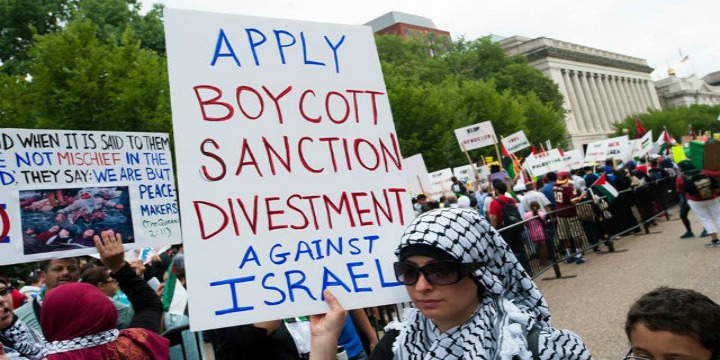Last Friday’s decision by District Court Judge Andrew Hanen of Texas has been lauded as a landmark victory by supporters of Israel boycotts — an irony, given the opinion actually upholds the constitutionality of state laws that deem such boycotts discriminatory and restrict government involvement in companies that adopt such boycotts.
The recent wave of anti-BDS legislation has been adopted to protect people with Israeli connections from facing discrimination. “Boycotting Israel” has never meant boycotting the government of Israel — it has always meant boycotting the people of Israel, the vast majority of whom are Jewish. Anti-BDS laws do not reach all private contracts, but rather prohibit companies with state contracts from engaging in boycotts of those with Israeli ties.
The latest lawsuit is part of a wave of recent litigation, spearheaded by the American Civil Liberties Union (ACLU) and the Council on American-Islamic Relations (CAIR), to upend such protections for Israelis and those with ties to Israelis.
CAIR launched the current lawsuit on behalf of an engineering firm, owned by Texas citizen Rasmy Hassouna. Hassouna’s firm had a contract with the city of Houston, and as a result of a recent Texas anti-BDS law, the firm was prohibited from engaging in a boycott of Israelis. Hassouna alleged that the state’s law amounted to a violation of his First Amendment rights.
In the wake of Hassouna’s narrow injunctive relief — which the court actively refrains from applying on a statewide level — CAIR has taken to valorizing the opinion as concrete evidence of the wholesale unconstitutionality of anti-BDS legislation, which currently remains on the books in some fashion (either by law, executive order, or resolution) in 35 states.
“State lawmakers should note this decision,” asserted CAIR’s National Litigation and Civil Rights Director Lena Masri. “There’s no place for banning boycotts under the First Amendment.”
CAIR’s Senior Litigation Attorney Gadeir Abbas echoed a similar assessment. “These regressive attempts to create a Palestine-exception to the First Amendment betray the central role boycotts have played in our history.”
But CAIR is patently wrong in its legal analysis, rendering the recent victory lap is nothing short of bizarre. While the opinion does deem a fraction of the language in the Texas law unconstitutional, the opinion itself explicitly asserts that most of the language in the Texas statute — including the central element prohibiting economic boycotts of Israel — is constitutional.
More specifically, Judge Hanen correctly notes that prohibitions of pure economic boycotts are not expressive and therefore, are not activities that fall within the ambit of the First Amendment.
Under Texas law, “boycott[ing] Israel” is defined as “refusing to deal with, terminating business activities with, or otherwise taking any action that is intended to penalize, inflict economic harm on, or limit commercial relations specifically with Israel.”
The italicized portion of the statute, commonly known as a “residual clause,” serves to expand the rule’s application to situations not specifically stated in the rule. This is the language with which Judge Hanen took issue.
Hassouna had argued that the residual clause would result in the silencing of various forms of protected speech, such as pro-BDS orations or picketing activities outside Israeli-owned businesses. Whatever one’s views of Israel, all such forms of protest are and should be constitutionally protected.
Indeed, authors and proponents of anti-BDS laws have always emphasized that anti-BDS laws are designed to target business conduct, not speech itself. While language like Texas’s can be found in many state laws, it has never been applied in the way the judge interpreted it.
However, the Constitution does not protect commercial conduct, even if it has some ideological meaning. Obviously, no anti-discrimination laws would be constitutional if a company could just say they were “boycotting” gay individuals because they disagree with the policies they pursue. The Supreme Court’s 2006 decision in Rumsfeld v. FAIR asserted this very point when it held that the government may withhold federal funding from universities that opt to boycott military recruiters. In short, the First Amendment is designed to safeguard speech, not conduct, regardless of the motives for the conduct.
Judge Hanen’s opinion, by asserting the constitutionality of the very heart of the Texas’ anti-BDS statute, hardly furnishes CAIR with a lasting legal victory. Instead, it provides states with a robust reminder that the core of such laws is constitutionally sound.
CAIR’s effort to paint their recent court fight as a resounding win is dishonest, but mild compared to their generally unpleasant history.
Just two months ago, the Texas CAIR chapter was raising a defense fund for Aafia Siddiqi, a woman currently serving an 86-year sentence for shooting at U.S. service members in Afghanistan. If the name rings a bell, it is because the Coleyville synagogue attacker, like CAIR, also demanded her release. Siddiqi was known as a rabid antisemite who requested that the jurors in her trial be genetically tested to ensure a non-Jewish jury.
Given these activities, it should come as no surprise that CAIR’s founders are two individuals from the Islamic Association of Palestine (IAP), an offshoot of the terrorist organization Hamas. Advocating in defense of the BDS movement — a movement whose current leader openly supports terrorism against Jews and peddles antisemitic conspiracy theories — is undoubtedly befitting of such an organization.
Erielle Davidson is the associate director of the Center for the Middle East and International Law at George Mason University’s Antonin Scalia Law School.





